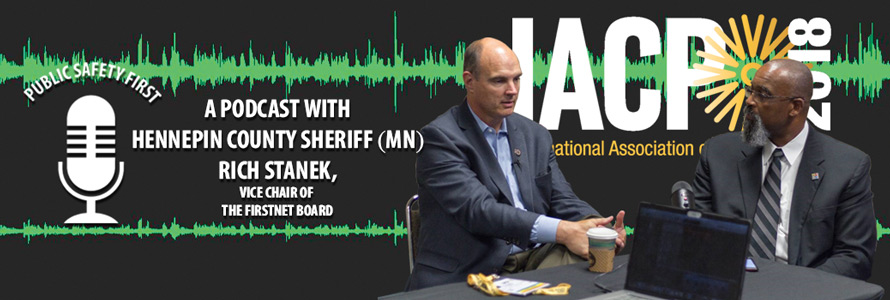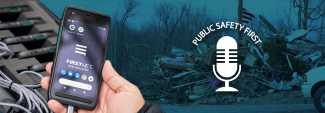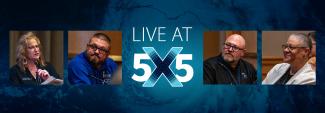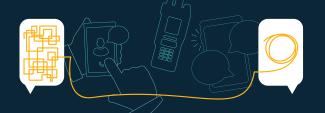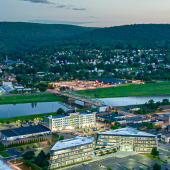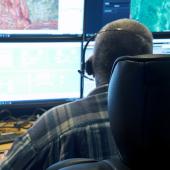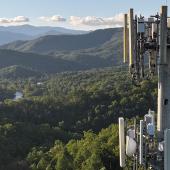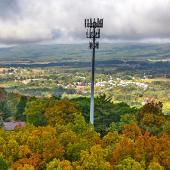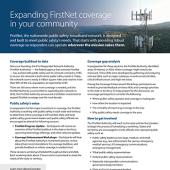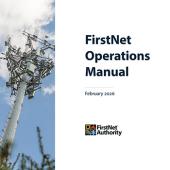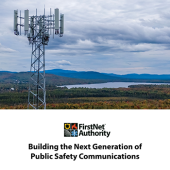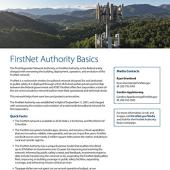Summary
In the latest episode of Public Safety First, FirstNet Authority’s Senior Law Enforcement Advisor, Harry Markley and the FirstNet Board’s Vice Chair, Hennepin Co. (MN) Sheriff Richard Stanek sit down at the 2018 IACP Annual Conference and Exposition to chat about how FirstNet benefits law enforcement and the evolution of public safety technology.
Guest
Harry Markley
FirstNet Authority Senior Law Enforcement Advisor
Sheriff Richard Stanek
Hennepin County Sheriff’s Office, Minnesota; FirstNet Authority Board Member
Transcript
Preview
Narrator: You're listening to the Public Safety First, a podcast to help you learn about the First Responder Network Authority and how you can be part of the future of public safety technology.
Harry Markley: Good afternoon, I'm Harry Markley. I'm the Law Enforcement Senior Advisor for the FirstNet Authority. I am here at the IACP conference with Sheriff Rich Stanek from the County Sheriff's office, here to talk a little bit about FirstNet and how it’s benefited his agency and also about his new role on the FirstNet board. So Sheriff, thanks for joining me today!
Narrator: You're listening to the Public Safety First, a podcast to help you learn about the First Responder Network Authority and how you can be part of the future of public safety technology.
Harry Markley: Good afternoon, I'm Harry Markley. I'm the Law Enforcement Senior Advisor for the FirstNet Authority. I am here at the IACP conference with Sheriff Rich Stanek from the County Sheriff's office, here to talk a little bit about FirstNet and how it’s benefited his agency and also about his new role on the FirstNet board. So Sheriff, thanks for joining me today!
Richard Stanek: Yeah, my pleasure thanks for having me here! You know as you said, my role with FirstNet is I serve on the FirstNet board which is not necessarily a technical position, but more of a policy setting component of FirstNet. I represent Public Safety myself, and Richard Ross the Commissioner out of Philadelphia, we represent the police officers, firefighters, and medics across the country as we integrate FirstNet.
Harry Markley: Wonderful, can you tell me just a couple of use case scenarios, or just a couple of examples of how FirstNet is benefiting your agency now?
Richard Stanek: It's really important for folks to remember, what's unique about FirstNet is that it is singularly built for public safety; our cops, our firefighters, our emergency medical service providers with redundancy, encryption, hardened. And you know, as much as we know about it today, in the years to come I think it will continue to grow and expand and all people can do today is dream about what might be the next three, four, five, ten years out, with the advent of FirstNet.
Harry Markley: Wonderful. Sheriff, I spent just over 31 years in law enforcement myself and I can tell you in my time the tremendous differences and changes in communication. How has communication changed in your time as sheriff, even, or just since your time in law enforcement?
Richard Stanek: Yeah tremendously. You know, when I started 35 years ago with Minneapolis Police we had handheld radios but they were a literally bricks. They were big, they were heavy, and they were cumbersome. And you know, we didn't have cell phones back then, and then you know, cell phones started coming on scene, smart devices, iPads, folks barely had laptops. Now today, you know, I told folks earlier this morning, I buy a new smart device once a year, sometimes twice a year, because the technology has changed so much. I couldn't imagine going back to a day thirty-five years ago, riding a squad car, patrolling the neighborhood, without a smart device to keep me connected. That's where FirstNet comes in and you know and again, I think folks who have been here for years and years in Public Safety, versus men and women who are just starting out who have grown up with this – tremendous difference between the two.
Harry Markley: Thank you. Speaking from my own experience, when I came on in 1986, we didn't issue radios to police officers. Our radio was part of the car; you slid into the car and at the end of the shift, you took it out, you turn it into the front desk, and you fast forward now and you know you have officers that are issued smart phones, and officers that are issued laptops, and officers that are issued iPads and radios. It's really changed the face of police work. It's also changed the way that dispatchers and the public can communicate with the police. It's been a fantastic way to change policing. You guys recently held a Super Bowl in your city can you tell me how FirstNet helped you further that mission?
Richard Stanek: Yep, so over the last 12 years we've had four significant public safety events that have come upon Minneapolis and the Hennepin County area. You know the I-35 bridge collapse we've talked about at length, the all-star game, the Super Bowl, the Republican National Convention, the last one though was the Super Bowl back in February of 2018. And no matter which team you were rooting for at the end of the day, everybody was rooting for the cops, fire, and EMS. For the first time you know, we were interconnected. This was not an easy task. We had to have thousands of police officers and firefighters and EMS on scene. There isn't any single one agency in my county, or I'd venture very many counties or cities across this country, that could handle that by themselves. So, you rely on mutual aid, you rely on your neighboring communities to come in and assist, and in order to do that, you have to have that common denominator which is the interoperability – whether it's through a radio system and/or through data, and data played a big role in this year's Super Bowl.
Harry Markley: And Sheriff I know that we mentioned previously, but you have a new board position with FirstNet. Can you tell me where do you see the future of FirstNet being, and under your leadership where would you like to see it go?
Richard Stanek: Yeah, you know I'm excited, I mean I think about going back 12, 13, 14, years ago when you know we had a lot of discussion about what a FirstNet type scenario might look like, and in Congress doing the appropriation of monies, getting FirstNet started. I joined the board four years ago, coming in, representing Public Safety. Now today, I serve as the Vice Chair of the Board, and Chair of the Outreach Public Policy or Public Safety Advocacy Committee. I think about the members of the board, you know made up of several government officials like Department of Homeland Security, or Department of Justice or the Office of Management and Budget. But really, it's about the private sector and the public sector working together: myself, Richard Ross, what was Jeff Johnson, the Fire Chief, or Kevin McGinnis, an EMS paramedic coordinator. You know, we worked hand-in-hand with our private sector partners in order to provide the technical side, the operational side, of what FirstNet has now become, and will become moving into the future.
Harry Markley: And so sheriff, to expound on that just a little bit, I know that you’re a sheriff of a large county, you have a lot of a lot of work to do and I’m sure it keeps you very busy, so we're very happy that you have taken with us. But, just a very basic question, that is, why do you serve on the board?
What is your motivation for serving on the FirstNet board?
Richard Stanek: You know, my motivation was just that I watched what happened on September 11th of 2001, like everyone. In terms of the interconnectivity/interoperability of a land mobile radio system. I also know though watching the horrific images on TV, and talking with first responders out of New York, and Pennsylvania, and Washington DC and some of the things that they saw at the time. It wasn't so much what they saw, it’s what's they wish they had – which was something to connect them all together: pushing the data; pushing data from the scene of the incident out to the firefighters who were arriving or to responding police, where there's state local or federal agencies. If you think about just 17 short years ago, how far we've come in this country, FirstNet was one of the recommendations out of the 9/11 Commission Report, meaning interoperability of data and providing a public safety network that's built just for us. You know I don't mind having a personal phone with a different network but what I get with FirstNet is I get end-to-end encryption; I get a hardened network that's built for what I do and the men and women who work in my agency do every single day. I get what is enough data allowed to be able to push things out to the responding men and women on scene. Whether it's somebody takes a video of a carjacking, or a fire, or a crash out on the highway, I will be able to get that at my dispatch center and then turn around and get that out to the men and women who are responding to the scene. It is seamless, and it will be a big boon, a big boost to public safety when we're able to do that as a regular occasion, rather than you know a trial or a test period.
Harry Markley: So sheriff I'd be interested in hearing your opinion on what you think the future of Public Safety will be as FirstNet evolves and becomes more, I guess used, by agencies throughout the country?
Richard Stanek: You know that's really, it's a great question, but also a dangerous question. As we talked about, you know you've got three decades of law enforcement experience, I have three decades. I don't think we could have envisioned three decades ago where we're at today, much less the advent of FirstNet helping boost us into the future and so, I think the future is not as clear as I would like it to be because I'm not quite sure what may come out of the next 12 months, 24, 36 months. One thing's for sure, I'll probably get a new smart device or two. One thing's for sure, as FirstNet continues to roll out across this country, more and more communities both urban and rural across this country will be interconnected. And the one thing I know for sure, is that every day there is a polarizing incident that happens somewhere in this country, sometimes more. It may be a school shooting, it may be a natural disaster; FirstNet will be on scene to provide resources and services to local law enforcement, fire, and EMS, in order to help them mitigate and recover as we would wish.
Harry Markley: Sheriff, I couldn't agree with you more when you say we don't know, because technology changes so fast. I can tell you that you know 10, 11, 12 years ago whenever they came out with the iPhone, there was a couple hundred apps that were available. I know that I was really intrigued and I could turn my phone sideways and the picture would flip sideways, or I could make my fingers pinch them in and out and the picture would get smaller or larger and that was the extent of the fascination with the iPhone at that time. Now, you fast forward that 10, 11, or 12 years and there's, I couldn't tell you how many apps, thousands and thousands of apps, and the phone has 512 gigs of memory, and it has the ability to do the computing that is far beyond any computing we could have ever imagined just five years ago. So, what the future holds, like it's exciting to know, but it's so much is unknown because technology moves so fast.
Richard Stanek: Well, let me just add to that for a minute because, going back, you don't even have to go back very far, just a couple decades ago, you know if you had a bank robbery in one of the suburbs in my county, you'd be lucky if you could get a photo from the bank robbery, and if you could send it to someone, it probably was a fax – a black and white fax – which wasn't very detailed in terms of description. Today, I can get a colored JPEG photo directly from the bank to my dispatch back out to the squad car within a matter of minutes in some cases. It may be even more direct-connect than that as the future moves forward, or like I talked about earlier, you know video from a fire, a structure fire, as the firefighters are responding so the commander knows how many assets he or she should send and what type of assets and equipment. That is something that we, you know we talk about. I think the general public, right, sees on TV and they think ‘ah law enforcement has that,’ well the dirty little secret is law enforcement doesn't have that. We wish we had it, we now are going to have it, but it's incumbent upon us, all that all the Chiefs and law enforcement and line personnel who are at the IACP – this whole conference is built around technology – and as the technology improves, so will our response in providing Public Safety to the residents of our cities and counties.
Harry Markley: Excellent points, and I will say this also about technology, and about the application ecosystem. You know we’re just starting off this application ecosystem for FirstNet. If you look at the hundreds of thousands of apps that are available for just the general public you know. a lot of those apps are designed by people that are pushing out a product and then determining if the public wants it. What we'd rather do is talk to our customers, our law enforcement partners, and find out what it is they need and want out of this ecosystem and then design the programs and applications around that. So input is very valuable. So Sheriff, we've both been in policing for over three decades, and I can tell you that how we communicate and how we use technology has changed significantly, as well as the officers that work for us have changed significantly, and how they use technology. So, what do you think that the officers that work for you now, your new deputies that are coming up in the system, what do they want from technology and how do they differ in how we did our job when we first started?
Richard Stanek: You know that's another great question. I just had a very good discussion with 12 deputies who were hired by my agency. They're now coming into law enforcement. The average age was about 23 years, which is about right after a couple years of college and/or military service, and you know these men and women, while being very young, they were very astute. They grew up in the age of technology. They want information fast. They expect, literally at the speed of light, to be able to access data and send data. They're not so good at talking on the phone, but they sure as heck can text you and get the information to you. If you like, during the focus session I had with them, I brought up a term and many of them had no idea what that term was because it was old police jargon. But, you know two minutes later, one of them had looked it up on the internet while sitting there, and used it back at me. And you know, that’s what I would expect from our men and women who are becoming police officers, is to think on their feet, make decisions, do what they need to do, bring that common sense, but they do that literally with the speed of technology, and do it instantaneously. I think that better serves the public as well. The public expects and deserves to be protected. They expect and deserve to have the best and the brightest men and women working for them on their behalf, and likewise, as the Chief Law Enforcement Officer of my county, my job is to bring them and provide the technology, while at the same time you got to balance it out with privacy and civil liberties. We absolutely understand that, but to provide them the technology to be able to get the job done on behalf of the residents.
Harry Markley: Excellent points.
Richard Stanek: When you think about the youth of today, and there are new officers that are coming on our departments today, and our deputies, is there access to information it is unprecedented. I mean it is. It is amazing that what they have at their fingertips, and to be able to take that and leverage FirstNet along with their app or applications ecosystem – that's a force multiplier when it comes to their access to information. You know, one of the other things that amazes me about technology and young adults use of technology today is, I've got a son is 26 years old who's never taken a typing class ever and the kid types faster than I do. Now he does it with four fingers, but you know it's when I was in high school, I had to take a typing class to learn how to do that and it's just, it's just how we've evolved and how they have evolved and that is just through their use of technology.
Harry Markley: Well Sheriff, I want to thank you for your service for the board, and thank you for your service to your community, in our communities, and I really want to thank you for appearing on our podcast today. Again, we're meeting here at IACP today 2018. It's been a terrific conference so far, I hope you have the chance to visit the FirstNet booth, and also have a chance to sit in on some of our panels and some of our committee presentations. Thank you.
Richard Stanek: Yeah, my pleasure!
Narrator: Thanks for listening today. We're excited to have you join our podcast community. Make sure to subscribe on iTunes, SoundCloud and YouTube. You can learn more about the First Responder Network Authority at firstnet.gov and learn about FirstNet products and services at firstnet.com.


